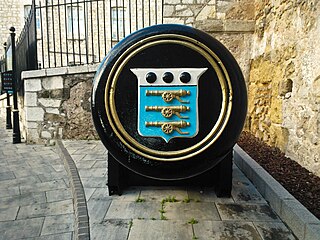Related Research Articles
These are Oxford poetry anthologies of English poetry, which select from a given period. See also The Oxford Book of Twentieth Century English Verse and Eighteenth century women poets: an Oxford anthology.
Several anthologies of religious poetry have been published by Oxford University Press.
More Letters of Charles Darwin, a sequel to The Life and Letters of Charles Darwin of 1887, was a book in two volumes, published in 1903, edited by Francis Darwin and Albert Seward, containing as the title implies, additional publications of 782 letters from the correspondence of Charles Darwin.

The Principal Storekeeper of the Ordnance was a subordinate of the Master-General of the Ordnance and a member of the English Board of Ordnance from its constitution in 1597. He was responsible for the care and maintenance of ordnance stores. The office was abolished in 1855.
The High Sheriff of Monaghan was the British monarch's representative in County Monaghan, a territory known as his bailiwick. Selected from three nominated people, he held his office for the duration of a year. He had judicial, ceremonial and administrative functions and executed High Court Writs.
This article is about the particular significance of the year 1902 to Wales and its people.
This article is about the particular significance of the year 1901 to Wales and its people.
This article is about the particular significance of the decade 1700–1709 to Wales and its people.
This article is about the particular significance of the century 1601–1700 to Wales and its people.
This is a list of High Sheriffs of Carmarthenshire. Carmarthenshire was originally created by the Statute of Rhuddlan in 1284. It became an administrative county in 1889 with a county council following the Local Government Act 1888. Under the Local Government Act 1972, the administrative county of Carmarthenshire was abolished on 1 April 1974 and the area of Carmarthenshire became three districts within the new county of Dyfed : Carmarthen, Dinefwr and Llanelli. Under the Local Government (Wales) Act 1994, Dyfed was abolished on 1 April 1996 and the three districts united to form a unitary authority which had the same boundaries as the original Carmarthenshire but remaining in the shrievalty of Dyfed.
Honouring individuals buried in Westminster Abbey has a long tradition. Over 3,300 people are buried or commemorated in the abbey. For much of the abbey's history, most of the people buried there besides monarchs were people with a connection to the church – either ordinary locals or the monks of the abbey itself, who were generally buried without surviving markers. Since the 18th century, it has become a prestigious honour for any British person to be buried or commemorated in the abbey, a practice much boosted by the lavish funeral and monument of Sir Isaac Newton, who died in 1727. By 1900, so many prominent figures were buried in the abbey that the writer William Morris called it a "National Valhalla".
The High Sheriff of Londonderry City, or High Sheriff of Derry, is the sovereign's judicial representative in the city of Derry. High Sheriff of Londonderry is a title and position which was created in 1900 under the Local Government (Ireland) Act 1898, with Sir John Barre Johnson the first holder. Like other high sheriff positions, it is largely a ceremonial post today. The appointment is officially made by the Secretary of State for Northern Ireland on behalf of the King. The outgoing high sheriff nominates his or her successor, except in Belfast where councillors nominate a serving member of the city council. Prior to 1900 sheriffs, initially two per year, but later only one, were elected by the city council.
Additional information needed
The royal households of the United Kingdom consist of royal officials and the supporting staff of the British royal family, as well as the royal household which supports the sovereign. Each member of the royal family who undertakes public duties has their own separate household.
References
- ↑ "Dictionary Editors". Oxford English Dictionary . Retrieved 6 March 2017.; "Dictionary milestones in reverse order". Oxford English Dictionary . Retrieved 6 March 2017.
- 1 2 3 4 5 6 Dirda, Michael (11 October 2023). "The most influential crowdsourcing project happened long before Wikipedia". Washington Post.
- ↑ Hay, Daisy (19 October 2023). "Rare, Obsolete, New, Peculiar". London Review of Books.
- ↑ Keane, Erin (22 October 2023). "Before Wikipedia, there was the Oxford English Dictionary". Salon.
- ↑ Duncan, Dennis (13 October 2023). "In the Beginning Were the Word Nerds". The New York Times.